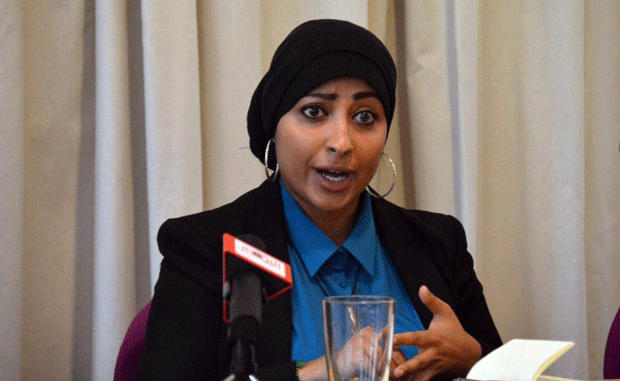Index relies entirely on the support of donors and readers to do its work.
Help us keep amplifying censored voices today.

Maryam Al-Khawaja spoke out in October for the release of fellow human rights activist Nabeel Rajab. (Photo: David Coscia for Index on Censorship)
Nine people have been arrested in Bahrain for “misusing social media”, a charge which is punishable by a fine or up to two years in prison.
Human rights defender Nabeel Rajab was last week sentenced to six months in prison over a tweet he posted which was deemed insulting to public institutions. Rajab has been bailed, and tweeted on 21 January that he will appeal his conviction on 11 February.
Human Rights Watch has dedicated seven pages of its 25th annual report to Bahrain. The World Report 2015, released on Thursday, reviews the human rights situation in over 90 countries.
The report states that over 200 defendants have been sentenced to long stints in prison by the Bahraini courts on charges of national security or terrorism, with at least 70 of those being sentenced to life.
It says: “Bahrain’s courts convicted and imprisoned peaceful dissenters and failed to hold officials accountable for torture and other serious rights violations. The high rate of successful prosecutions on vague terrorism charges, imposition of long prison sentences, and failure to address the security forces’ use of lethal and apparently disproportionate force all reflected the weakness of the justice system and its lack of independence.”
In December, co-director of the Gulf Center for Human Rights (GCHR), Maryam Al-Khawaja, boycotted a court hearing which saw her sentenced to one year in prison. Al-Khawaja was charged with assaulting two policewomen last year when she traveled to Bahrain to visit her father Abdulhadi, who is currently serving a life sentence for his involvement in anti-government protests in 2011. In related news, the GCHR website was yesterday reportedly blocked in the United Arab Emirates.
Al-Khawaja’s sister Zainab was arrested in October on charges of insulting the king, and gave birth to her second child just a few days before being sentenced to three years in prison. She was then sentenced to an additional 16 months less than a week later, on separate charges of insulting a public official.
This article was published on 30 January 2015 at indexoncensorship.org

Lord Avebury, the Vice Chairman of the Parliamentary Human Rights Group cordially invites you to a press conference on:
Four years of revolution: Bahrainis insist on political change
Four years ago the people of Bahrain flocked to the streets in their thousands seeking fundamental political change after decades of discriminatory rule. They were repressed by the regime which adopted reprehensible tactics including systematic torture, extra-judicial killing, and the revocation of citizenships. The UK Government has chosen to stand by the regime, turning a blind eye to its rights abuses. It is time for the UK to change direction on Bahrain starting by designating it as a “country of concern” in line with the Foreign Affairs Committee recommendations.
WHERE: Fielden House, 13 Little College Street, London SW1P 3SH
WHEN: Tuesday 10 February 2015, 11:00am

Nabeel Rajab during a protest in London in September (Photo: Milana Knezevic)
Human rights campaigner Nabeel Rajab was sentenced to six months, which would be suspended pending a fine, Rajab’s lawyer told the BBC.
Rajab has been granted bail while he appeals the verdict in his case.
In October a court ruled that Rajab would face criminal charges stemming from a single tweet in which both the ministry of interior and the ministry of defence allege that he “denigrated government institutions”. Rajab could have faced up to six years in prison.
many #Bahrain men who joined #terrorism & #ISIS came from security institutions and those institutions were the first ideological incubator
— Nabeel Rajab (@NABEELRAJAB) September 28, 2014
“Nabeel Rajab has been sentenced for doing nothing more than exercising his right to express an opinion. We condemn the actions of the Bahraini authorities – whose foreign minister marched in Paris to defend freedoms that Bahrain denies the people in its own country. We urge the UK and other allies of Bahrain to join us in calling for this sentence to be overturned,” Index on Censorship CEO Jodie Ginsberg said.
In a visit to the Index on Censorship offices in September, Rajab campaigned on behalf of then-detained Maryam Al-Khawaja and spoke about the human rights situation in Bahrain.

Nabeel Rajab during a protest in London in September (Photo: Milana Knezevic)
Index on Censorship is calling on the government of Bahrain to drop its charges against human rights campaigner Nabeel Rajab.
In October a Bahraini court ruled that Nabeel Rajab would face criminal charges stemming from a single tweet in which both the ministry of interior and the ministry of defence allege that he “denigrated government institutions”. If convicted, Rajab could face up to six years in prison.
many #Bahrain men who joined #terrorism & #ISIS came from security institutions and those institutions were the first ideological incubator
— Nabeel Rajab (@NABEELRAJAB) September 28, 2014
“Nabeel Rajab, an Index on Censorship Freedom of Expression award winner, was arrested for a tweet in which he did no more than simply express an opinion. For this he faces years in jail. As the world renews its focus on freedom of expression it is vital that we defend those punished for speaking out no matter where they are in the world. Join us in calling for Nabeel’s release,” Index on Censorship CEO Jodie Ginsberg said.
15 January 2015 — 16 human rights organisations have written to 47 States to express grave concern ahead of a 20 January verdict in the trial of Nabeel Rajab, a prominent Bahraini human rights defender. Additionally, Americans for Democracy and Human Rights in Bahrain, The Bahrain Center for Human Rights and The Bahrain Institute for Rights and Democracy sent letters to members of parliament in all 47 States and United Nations officials, urging them to publicly call on the Government of Bahrain to drop all charges against Rajab.
On 1 October 2014, Rajab reported to the Cyber Crimes Unit of Bahrain’s General Directorate of Criminal Investigations (CID) after being summoned for questioning. Following hours of interrogation in relation to a tweet he published while abroad, Rajab was arrested. The tweet read: “Many #Bahrain men who joined #terrorism & #ISIS came from security institutions and those institutions were the first ideological incubator.”
For this tweet, Rajab was charged with insulting the Ministries of Interior and Defense under article 216 of Bahrain’s penal code, which states that “A person shall be liable for imprisonment or payment of a fine if he offends by any method of expression the National Assembly, or other constitutional institutions, the army, law courts, authorities or government agencies.” Rajab was released on bail on 2 November, but was banned from traveling outside the country. If found guilty, he could face up to six years in prison.
The charges leveled against Rajab are illegal under Bahrain’s commitments to the international community and international human rights law. Bahrain is party to the International Covenant on Civil and Political Rights (ICCPR), having acceded to the covenant in 2006. Article 19 of the ICCPR provides everyone with the fundamental rights to opinion and expression. Further, international jus cogens norms protect against the arbitrary deprivation of liberty, especially in relation to acts related to free expression. By prosecuting Rajab for statements that he made over Twitter, the Bahraini government violates its own commitments to the international community.
The ongoing suppression of basic human rights in Bahrain has drawn heavy criticism from the international community. In June 2014, 47 United Nations Member States signed a joint statement on Bahrain expressing concern “about the continued harassment and imprisonment of persons exercising their rights to freedom of opinion and expression, including human rights defenders.” The statement also called on Bahrain to “release all persons imprisoned solely for exercising human rights, including human rights defenders.” In 2014 a European Parliament resolution also called for “the immediate and unconditional release of all prisoners of conscience, political activists, journalists, human rights defenders and peaceful protesters, including Nabeel Rajab. …”
The undersigned NGOs close the letter by urging the international community to explicitly and publicly call for the Government of Bahrain to immediately drop all charges against Rajab and the many others currently facing charges or serving arbitrary jail sentences for exercising their rights to freedom of expression, association and assembly.
NGO signatories:
Amnesty International
CIVICUS
English Pen (Letter to the UK Foreign Office only)
Freedom House
Front Line Defenders
Human Rights Watch
Index on Censorship
Pen International
Project on Middle East Democracy
Rafto Foundation for human rights (Letter to the Norwegian Ministry of Foreign Affairs only)
FIDH in the framework of the Observatory for the Protection of Human Rights Defenders
OMCT in the framework of the Observatory for the Protection of Human Rights Defenders
Americans for Democracy and Human Rights in Bahrain
Bahrain Center for Human Rights
Bahrain Institute for Rights and Democracy
Gulf Center for Human Rights
Additional Background:
Nabeel Rajab is the President of the Bahrain Center for Human Rights, Deputy Secretary General of the International Federation for Human Rights (FIDH), and a member of Human Rights Watch’s Middle East Advisory Board.
Bahraini authorities have previously prosecuted Rajab on politically motivated charges. They have never presented any credible evidence that Rajab has advocated, incited or engaged in violence.
Rajab was detained from May 5 to May 28, 2012, for Twitter remarks criticizing the Interior Ministry for failing to investigate attacks carried out by what Rajab said were pro-government gangs against Shia residents. On 28 June 2012, a criminal court fined him 300 Bahraini Dinars (US$790) in that case.
Authorities again detained Rajab on 6 June 2012, for another Twitter remark calling for Prime Minister Khalifa bin Salman al Khalifa to step down. On 9 July 2012, a criminal court convicted and sentenced him to three months in prison on that charge. A court of appeal overturned that verdict, but in a separate case a criminal court sentenced him to three years in prison for organizing and participating in three unauthorized demonstrations between January and March 2012. An appeals court reduced the sentence to two years, which Rajab completed in May 2014.
In September 2014, Rajab traveled to Europe to call for stronger international action on Bahrain. He met with representatives of various European governments and the EU, spoke to the media, and addressed UN fora.
In the current case, Rajab was detained on 1 October 2014, within 24 hours of his return to Bahrain.